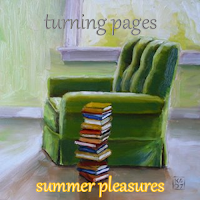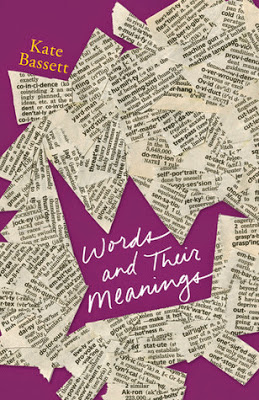 Novels dealing with death in young adult literature aren’t exactly new – we’re currently living in The Summer of the Cancer Novel, hello – but what’s always new is every young person’s – really, every person’s – way of dealing with death – dealing with loss, dealing with grief. Some choose to go on and have super relationships in the face of death — and other people just… choose, as their means of “dealing,” not to deal with it at all. Kate Bassett’s debut novel with the clever, origami-wordy cover, explores what happens while dealing, and shows readers one girl’s way of finding a path out of the dark.
Novels dealing with death in young adult literature aren’t exactly new – we’re currently living in The Summer of the Cancer Novel, hello – but what’s always new is every young person’s – really, every person’s – way of dealing with death – dealing with loss, dealing with grief. Some choose to go on and have super relationships in the face of death — and other people just… choose, as their means of “dealing,” not to deal with it at all. Kate Bassett’s debut novel with the clever, origami-wordy cover, explores what happens while dealing, and shows readers one girl’s way of finding a path out of the dark.
Summary: Anna O’Mally is seventeen, and experiencing her first losses. Unfortunately, they’re world-shattering. First, Anna’s experiencing the loss of being clever — when she loses the London writing fellowship she’s positive she was fated to have, she’s not able to believe in herself as a powerhouse writer anymore. Second, the loss of The Good Life – now that her uncle, who was raised as her brother, has died, she is wracked with guilt — guilt that isn’t hers, but guilt nonetheless. Finally, she’s experienced the loss of childhood – and innocence. With the death of his brother, her father has gone off the rails into some clichéd midlife crisis and gotten his young secretary pregnant. It sucks to be Anna right now — except, that it doesn’t. Not entirely. She has people who love her, a grandfather and mother still deeply involved in her life and caring about her – and a best friend who has grieved next to her and stayed with her step-by-step – through the hospitalization, the coffin-yoga, and the general “meh” attitude about life and everything. Anna’s been taking everything at face value, filtered through the lens of her massive self-centeredness. When she finds out that not everything is as she believed, she’s thrown out of her spin — and into somewhere she’s never been before: self-exploration. Self-awareness. And maybe, finally, personal truth.
Peaks: This book is a pitch-perfect reflection of grief. With that said, it is sometimes slow, sometimes bruising, sometimes boring. The protagonist is sometimes thoroughly grating and unlikeable. If you’re looking for prettied up versions of grief, you won’t find them here: this is the real deal. Anna wallows, and that’s who she is. Her life is one long chant of ritual — wake up and do This. Eat That. Find a phrase for the day. All of these things are designed to keep grief — feelings — at bay, but of course, none of it works. There are too many cracks in the world to seal them up with glue sticks and band-aids. Whistling through the graveyard isn’t going to help: Anna’s “bruncle” Joe is irretrievably gone, her baby sister has turned into Houdini the vanishing artist, her mother has turned into someone who sighs and finally actually sides with her father to threaten her with some kind of Christian anti-suicide school, and her grandfather is folding paper cranes. Endlessly.This is not a portrait of a family doing well.And yet, this is the portrait of a family. No matter that they are falling apart at the seams, no matter that they have made catastrophically poor choices, no matter that they are whistling past the graveyard as the roof caves in, they are present and are trying to love each other the best way they know how. The family in this novel is colossal. And, they eventually get better… because even grief — a grief that you try your best to hold onto, because you feel like it’s the only thing that means something? Even grief fades. Time wins, every time. The trick is the make that win mean something.
Valleys: This book is a pitch-perfect reflection of grief. It is selfish, self-centered, grating, unpleasant, and at times utterly banal. The pacing is slow, and the pressure of ritual, secrets, and pain is intense. There’s a plot twist which wasn’t surprising to me, which I think many readers will anticipate — but what isn’t intended to be a plot twist, what I refer to as a “Little Women” (remember when Amy burns Jo’s manuscript???) moment in the novel ENRAGED me. I was shocked that the protagonist – much lauded as a wordsmith – seems to take this violation in stride. I truly expected more of a reaction to the transgression, but perhaps by that point, so much has happened to the protagonist that the author was simply ready to move the character forward and conclude the novel. I felt that the realistic angst in trying to find a model for forgiveness for someone you deeply love and also somewhat hate would have made for a bittersweet and very realistic conclusion.
 Anna’s Uncle Joe died of something horribly like meningitis – a simple cold turned ‘flu turned superbug. The novel never names it – H1N1? Swine ‘flu? Not naming the disease seemed unnecessarily mysterious to me. This is a tiny quibble, given that the sickness is part of the mystery in the novel, but I kept wondering why the name was an actual unknown.
Anna’s Uncle Joe died of something horribly like meningitis – a simple cold turned ‘flu turned superbug. The novel never names it – H1N1? Swine ‘flu? Not naming the disease seemed unnecessarily mysterious to me. This is a tiny quibble, given that the sickness is part of the mystery in the novel, but I kept wondering why the name was an actual unknown.
Aaaand, as is standard in the young adult realistic fiction world, it seems, there’s the romance. I admit to being really disappointed by this – in one way. In another, a super dysfunctional romantic relationship made perfect sense; when we’re avoiding our own feelings we often latch onto other people like they’re our personal life buoys. That being said, I don’t think the relationship was portrayed as honestly as it could have been. It was torturous, and needy but survived — and I’m just not sure that someone so consumed within the firestorm of her own needs would have noticed another person in the room, stark naked and dancing a jig, much less a guy she just sees at a work gig. They have a rather clichéd “across a crowded room” moment, and both seem instantaneously bitten by the love bug. That he’s Latino, smokes, is a “bad boy” and she’s from the metaphorical “other side” of the tracks feels less true. The super-foreign feeling of his family as ethnic people I found questionable; it’s as if she’s never met Spanish-speaking Latino people before (and, maybe she hasn’t; Mario seems to be the only person of color in the entire novel with lines to speak).
Those quibbles aside, this is an intensely felt, deeply thoughtful novel which touches on our sometimes desperate need to step out from being ourselves and become someone else, the price we pay for that, and the way to get back home. This family-firm debut novel from Kate Bassett is a strong start, and we can expect more good things from her.
I received a copy of this novel courtesy of Flux. After September 8th, you can find WORDS AND THEIR MEANINGS by KATE BASSETT at online booksellers, or at an independent brick-and-mortar bookstore near you!